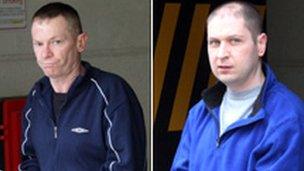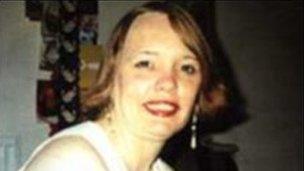O'Neill and Lauchlan lose Allison McGarrigle murder appeal
- Published

O'Neill and Lauchlan launched an appeal against their murder convictions
Two paedophiles who murdered a woman and dumped her body at sea have lost an appeal against their convictions at the Supreme Court in London.
William Lauchlan, 36, and Charles O'Neill, 50, killed 39-year-old Allison McGarrigle in 1997 after she planned to report them for abusing a boy.
They were jailed for 26 years and 30 years respectively.
The Supreme Court rejected claims of apparent bias by the trial judge and undue delay in bringing a prosecution.
Mrs McGarrigle met O'Neill and Lauchlan in 1994 after moving to Rothesay, Isle of Bute, following a split from her husband Robert.
She was introduced to them by the boy they went on to groom and abuse.
Child abused
During a court hearing in 2010 it emerged that Mrs McGarrigle lived in fear of the men and had threatened to tell police about their abuse of the child.
She was last seen alive on 20 June 1997. Lauchlan and O'Neill are believed to have strangled her, put her body in a wheelie bin and dumped it at sea.

Allison McGarrigle's body has never been discovered
Both men were detained on 17 September 1998 on suspicion of conspiracy to murder but no charges were brought.
Mrs McGarrigle was eventually reported missing by her estranged husband in 1998 and declared dead in 2005 when O'Neill and Lauchlan were charged with her murder.
They were released, however, after prosecutors decided not to go to trial at that stage.
The pair were eventually arrested - after several more instances of child abuse - during a police operation in 2008.
In May 2010, before the start of the trial, they were convicted of grooming a six-year-old boy having earlier sexually assaulted a 15-year-old boy while they were living in Spain.
O'Neill was also found guilty of drugging and sexually assaulting a 14-year-old boy in Irvine, Ayrshire.
After being given mandatory life terms for Mrs McGarrigle's murder, O'Neill and Lauchlan were also jailed for 10 years each for the sexual abuse charges.
Judge complaint
Following their convictions for murder, the pair launched appeals at the Court of Criminal Appeal in Edinburgh.
Judges rejected certain aspects of the proposed challenges, put forward as "not arguable".
But they granted leave for O'Neill and Lauchlan to take part of their case to the Supreme Court.
This relates to the delay over prosecution, and in O'Neill's appeal, over a complaint about comments of the trial judge at the end of the first trial on the abuse charges.
William McVicar, solicitor advocate for Lauchlan, had argued that the trial judge erred in rejecting a human rights challenge against undue delay in the prosecution.
He maintained that the starting point in assessing whether or not it was done within a reasonable time began in 1998 when O'Neill was interviewed by police under caution on suspicion of conspiracy to murder.
The appeal court authority ruled that it started when the accused first appeared in court on petition, which would have been 2005.
O'Neill's solicitor, advocate John Carroll, had also argued that Lord Pentland appeared to lack impartiality at the later murder trial.
'Further guidance'
At the end of the first trial, the judge described the men as "dangerous and evil sexual predators of the worst kind".
He then had to make decisions on challenges over the admissibility of evidence and on the fairness of the trial.
Mr Carroll also pointed out that Lord Pentland had rejected a move to adjourn proceedings to get medical help for O'Neill because of a severe headache while he was prepared to allow an adjournment when a police witness appeared to faint.
The appeal judges held that the delay point was not arguable but said they would allow it to be taken to London as "the issue raised is one which arises from statements in a decision of the Supreme Court on which that court may wish to provide further guidance".
Lord Hodge said they also adhered to the view that Mr Carroll's arguments over alleged prejudicial remarks and apparent bias by the trial judge were also not arguable.
'Unusual circumstances'
But he said they would grant leave to appeal to the Supreme Court as they recognised that splitting the proceedings into two phases before different juries and the resulting presentation of previous convictions and the judge's remarks at the end of the first trial were "very unusual circumstances".
Five judges at the Supreme Court in London have now rejected both aspects of the murderers' appeal.
In his written ruling, Deputy President Lord Hope acknowledged that the police were only in a position to charge the pair in 2005.
He concluded: "I would therefore hold that the date when the reasonable time began was 5 April 2005, and not 17 September 1998 when the appellants were detained and interviewed."
In relation to the trial judge Lord Pentland's comments, Lord Hope said: "I cannot find any basis for the suggestion that the judge was apparently biased, and I would reject it."
He said that there was nothing in the remarks made by the judge that were "outspoken" or "gratuitous".
- Published19 April 2012
- Published10 June 2010
- Published10 June 2010
- Published10 June 2010